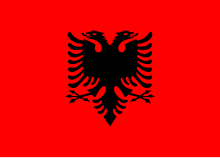Albanophilia
Albanophilia (literally love for Albania and Albanians) the expression by a non-Albanian person of a strong interest in or appreciation for the Albanian language, Albanian culture, Albanian literature, Albanian history or the Albanian people.
Albanophilia in Europe outside of the Balkans[]

Sweden[]
Johann Erich Thunmann in the 18th century supported the theory of the autochthony of the Albanians[1] and also presented the Illyrian origin theory.[2][3] Later on Gustav Meyer proved that Albanian language was part of the Indo-European family.[4]
Germany[]
In 2001 during the Insurgency in Macedonia the German foreign minister Joschka Fischer declared, that the Albanian question in the Balkans is not solved. Around 1912 Germany and Austria supported an Independent Albania, including cities like Parga, Tetovo and Prishtina.[5]
Albanophilia in Balkans[]

Montenegro[]
The Montenegrin Federalist Party was the only party in Montenegro which promoted common Illyrian theory with Albanians. The party's theoretician, Sekula Drljević, promoted ideas of a separate Montenegrin ethnicity (ideas that become more extreme throughout the 1930s), arguing that the Montenegrins were Illyrian.[6] He wrote:
Races are communities of blood, whereas people are creatures of history. With their language, the Montenegrin people belong to the Slavic linguistic community. By their blood, however, they belong [to the Dinaric peoples]. According to the contemporary science of European races, [Dinaric] peoples are descended from the Illyrians. Hence, not just the kinship, but the identity of certain cultural forms among the Dinaric peoples, all the way from Albanians to South Tyroleans, who are Germanized Illyrians.[7]
North Macedonia[]
According to the Gallup Balkan Monitor 2010 report, (53%) of the people living in North Macedonia support the idea to live in Greater Albania, although the same report noted that most thought this unlikely to happen.[8][9]
Notable Albanophiles[]
- Sekula Drljević – Montenegrin politician
- Edith Durham – British artist and anthropologist[10]
- Milan Šufflay – Croatian historian and politician
- Franz Nopcsa von Felső-Szilvás – Hungarian aristocrat
Pro-Albanian political parties[]
- Besa Movement
- Democratic Union for Integration
- Democratic Party of Albanians
- Alliance for Albanians
- Party for Democratic Prosperity
- Democratic Party
- Social Democratic Party of Switzerland
- Albanian Alternative
- Party of Democratic Action of Sandžak
- Party for Democratic Action
- Liberal Democratic Party
- Workers' Communist Party
References[]
- ^ Elsie, Robert (19 March 2010). Historical Dictionary of Albania. Scarecrow Press. p. 159. ISBN 978-0-8108-7380-3.
Johann Erich Thunmann (1746–1778) of the University of Halle first disseminated the theory of the autochthony of the Albanians
- ^ Schwandner-Sievers, Stephanie; Fischer, Bernd Jürgen (2002). Albanian Identities: Myth and History. Indiana University Press. p. 75. ISBN 0-253-34189-2.
Although the first major exposition of the Illyrian theory, published by the German scholar Johann Thunmann in 1774...
- ^ Stipčević, Aleksandar (1977). The Illyrians: history and culture. Noyes Press. p. 73. ISBN 978-0-8155-5052-5.
The first one who clearly formulated the thesis of the Illyrian origin of the Albanians, was the German historian Johannes Thunmann in the eighteenth century.
- ^ Philip Baldi (1983). An Introduction to the Indo-European Languages. SIU Press. pp. 87–88. ISBN 978-0-8093-1091-3.
In fact, Albanian was not established definitively Indo-European until the latter part of the nineteenth century, when certain structural and lexical correspondences that demonstrated the Indo-European character of the language were noted (especially by Gustav Meyer)
- ^ "deutschland-und-die-albanische-frage". blaetter. Retrieved 17 October 2018.
- ^ Morrison, Kenneth (2009). Montenegro: A Modern History. I.B. Tauris. pp. 47–49. ISBN 978-1845117108.
- ^ Banac, Ivo (1984). The National Question in Yugoslavia: Origins, History, Politics. Ithaca, New York: Cornell University Press. p. 290. ISBN 978-0-8014-9493-2.
- ^ Gallup Balkan Monitor Archived 27 December 2012 at the Wayback Machine, 2010
- ^ Balkan Insight Poll Reveals Support for 'Greater Albania' , 17 November 2010 [1]
- ^ Péter, László; Rady, Martyn C.; Studies, University of London. School of Slavonic and East European (1 January 2004). British-Hungarian relations since 1848. Hungarian Cultural Centre. p. 170. ISBN 978-0-903425-73-5.
Edith Durham, the noted Albanophile, comes here to mind.
- Admiration of foreign cultures
- Albanian culture
